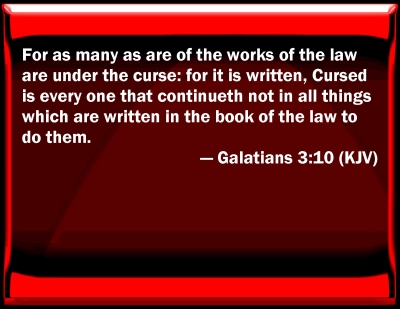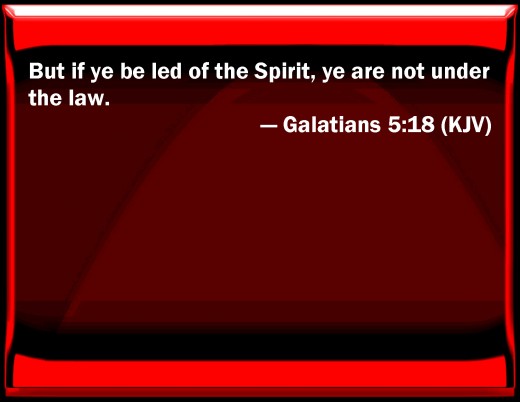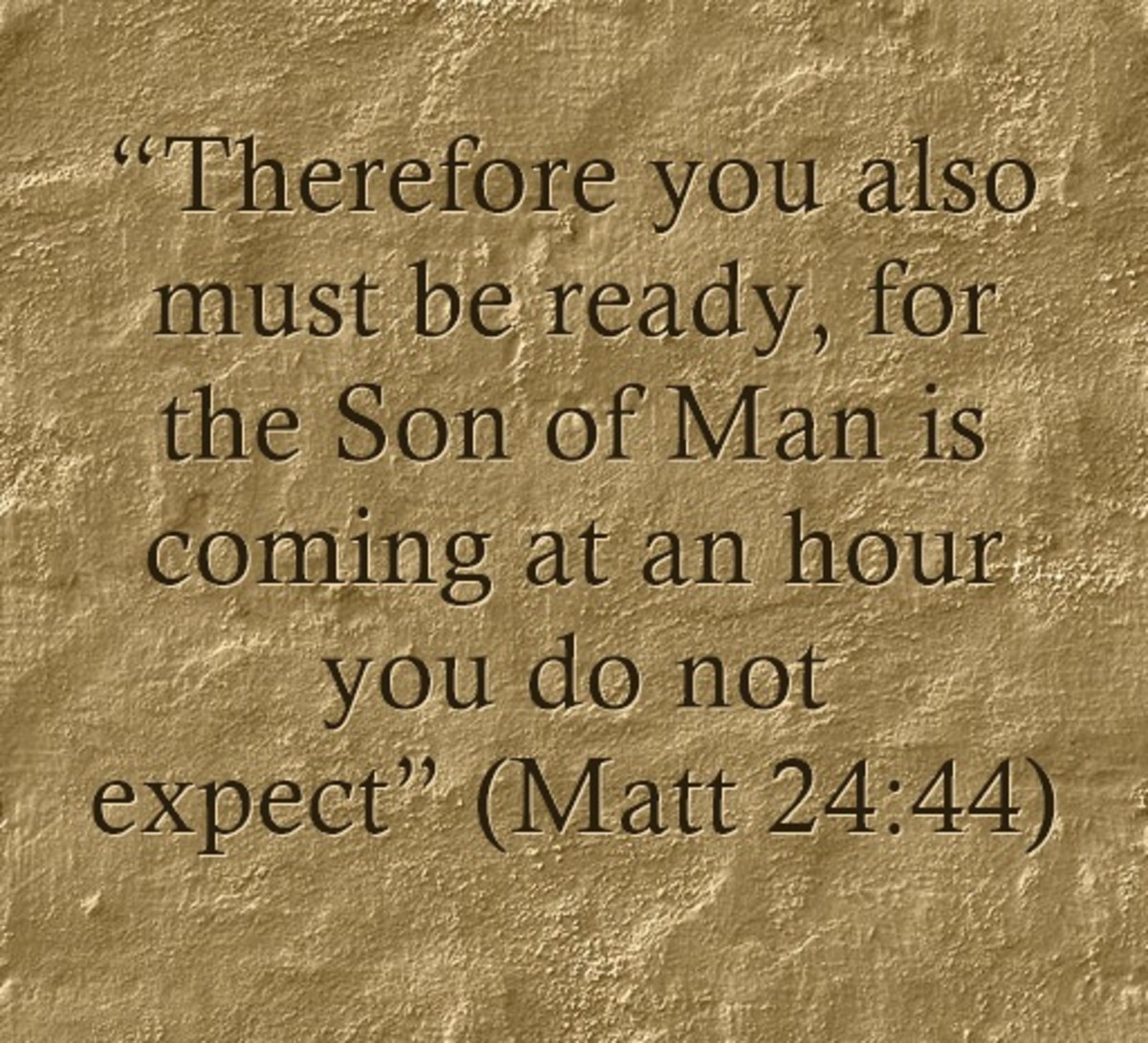Is the Law Done Away With? Part 2

Source for this part: The Mosaic Law Playlist
An examination as to what these verses really mean and how they are not about getting rid of the law. We will primarily be going over the real meaning behind these verses and what they mean:
- 2 Corinthians 3 1-18
- Hebrews 12 18-29
- Galatians 5 18
2 Corinthians 3 1-18
First, we must ask. What is Paul referring to when he uses the words, letter, ink, spirit of the living God hearts, tablets of stone, and hearts of living flesh. These are extremely key terms that are used.
We are going to examine these terms. Paul is obviously using a metaphor. We can't say he is literally calling men letters (epistles). There are three elements he is using.
- What is being written?
- What is being used to write it?
- What is it being written on?
We should ask what is being written on the hearts of man. We must continue reading before we can answer. And note thus far in this chapter there is no mention of the law being done away with. This would be an assumption. Let's continue. As we see, there is still nothing here regarding the law being done away with. Paul is simply saying our confidence is in God through Christ. Our confidence is in him, not in ourselves. We trust in him and what he has done.
Verse 6. This can be easily misunderstood to say that the law is done away with if proper cross-references are not used. We must look in the proper context. Remember the question we asked earlier; what is being written? He mentions the new testament (or new covenant) in this verse. It is important to know what this new covenant is according to the Old Testament perspective where this was prophesied. Here is what it has to say. Jeremiah 31 31-33 confirms that this is the fulfillment of the Old Testament law being written on their hearts.
So we see this is the cross-reference to the new covenant in the New Testament. What is it? His law being put into their hearts. The Hebrew word for law is Torah. In this time period and proper context there is only one law; the Torah, or the Law of Moses. The Ten Commandments and the books of the law after that. The word Torah, or law, by definition, means instructions. This is all it means. He is putting the law in the hearts of his people. So by these three verses, we can understand what is being put into the hearts of his people in 2 Corinthians. These laws were formerly written on tablets of stone and paper with ink and chisels, which are the scriptures.
Now let's go back to Paul's' words in 2 Corinthians 3 and address another aspect. in verse 6. Paul says the letter kills, but the spirit gives life. This has been taken out of context by those who say the law is done away with. But we need to further examine it. The Law of Moses and the Gospel are different, and the Gospel brings life while the Law kills. Let's suppose that is what he is saying by using Old Testament reference. If the law kills, we need proof of that. We need evidence that the law kills.
DEUTERONOMY 29 1
- "These are the words of the covenant, which the LORD commanded Moses to make with the children of Israel in the land of Moab, beside the covenant which he made with them in Horeb."
We see from verse 1 that this is not Moses's words, but words that he received directly from dictation from God. Everything he speaks carries on to the next chapter. DEUTERONOMY 30 15.
- "See, I have set before thee this day life and good, and death and evil;"
But Paul supposedly said the Law kills, but here we see that it gives life and death. Is Paul contradicting himself? No. They are partially true.
DEUTERONOMY 30 15.
- "See, I have set before thee this day life and good, and death and evil;"
So the choice is life and goodness, or death and evil. Reminder; this is the law that is being written on the hearts of the faithful and the obedient men who chose to believe in the Messiah and be reconciled to the Creator. So what is it from the law that brings death as Paul says? Simple. According to these verses obeying the law brings life. But disobeying it brings death. Disobeying the law is a long-term phrase for sin. We read that in 1 John 3 4. Sinning brings death. Transgressing his law brings death. Paul reminds us of this in Galatians 3 10.
Before we go on, look in Deuteronomy 30 11. I went over this in the previous article but this is for those who might have missed it or did not read it. Deuteronomy 30 11 says that the law "is not hidden from thee", meaning it is not too hard. The word used hfor "hidden" here is pala, which means to be surpassing or extraordinary. Law keeping is not impossible. What is impossible is to go your entire life without breaking the law. That was the common argument, but that has become an excuse to nullify the Torah. We insert our modern day dilemmas with keeping the law and say it is hard to keep. For example, some people can't get the Sabbath day off and have to fight for it or go work somewhere else. But back in ancient Israel having the Sabbath day was easy because it was a requirement. We are comparing two different societies.

This verse is a cross-reference to Deuteronomy 27 26. This does not say, "Cursed is everyone who tries to do the things written in the law". Trying to obey it is not a curse. It says those who do not obey it are cursed. This in no way means the law is done away with. There is no proof so far. That would be contradictory as earlier Paul said the law is written on the believer's heart. And since this is a reference to Jeremiah 31 31-33, an Old Testament verse where the law was still being followed. So the only conclusion based on scripture alone is that this is the law being written on their hearts. Saying it is anything else is just adding or not using proper context. Let's go to Romans 2 13.
- "(For not the hearers of the law are just before God, but the doers of the law shall be justified."
This sounds very much like that scripture in Jeremiah 31. These are people who are waking up and saying, "You know what? We should be keeping these laws". That is the spirit of the Creator working in their hearts.
Now let's go back to 2 Corinthians 3, and we will start at verse 7 and go to 8. Here is the answer to what is being written. It is a command that came forth from the mouth of the Creator through Moses chiseled on stone and written on paper, and it was glorious. So as glorious as that was, it is more glorious when these laws are being written on the hearts of men who will obey. Many quote Philippians 4 13 and say they can do all things through the Savior, but the law is unable to be followed by them. Where is their faith if you don't think the law can be followed without difficulty through the Savior, but yet they say they can do all things through him? And like earlier, no verse has said the law is done away with.
Verses 9-11. An example of verse 11 is that things get old and rot away. But the spiritual things live forever. So the words of the law should be written on the heart. Not only is this written in the Old Testament, but also in the New Testament. And Paul has in no way disagreed with this. The law is only a ministry of condemnation for those who condemn it and break it.
Verses 12-16. Here, Paul is referring to the rebellious ones who did not believe in the Savior. They did not understand how the Savior did what he did and fulfilled all of the prophecies. There is still a veil, and it cannot be removed until someone comes into the knowledge of the Savior and his true message. Many people read the Old Testament verses and do not understand how the Messiah came to fulfill these prophecies and verses. Many Jews believe that the law saves and that no Savior came. While on the other extreme, you have those who believe in the Savior and not the law. Both are wrong. The law is written in the hearts of the faithful, who are saved by grace alone. Their obedience to the law is a result of their salvation. Now let us read the rest of the verses in 2 Corinthians 3 as we said.
Verses 17-18. Simply said, none of these scriptures are saying the law is done away with as we can see with proper precepts. All things he has commanded means all of the things he commanded. Everything commanded by him is to be taught by all the people you want to convert.
Hebrews 12 18-29
Verses 18-20. So far nothing here says anything about doing away with the law. However, the words given for the law is being spoken of. All that is being said is that when the law was given, it was a terrifying moment that would cause one to fear the Creator and tremble at his word. No verse so far has said anything about the law being done away with. Let's continue.
Verses 21-24. Here, the book of Hebrews is simply telling us of where he has come to is different. It is metaphoric. The language of course, but nothing says the law is done away with. Moses did not die for anyone's sins. Although he stood in the gap many times and helped lessen the Almighty's wrath on his people. He was the mediator at that time. But what the Savior has done is better. He has died and become the High Priest in the true tabernacle, which the obedient and faithful ones have access to. They have access to this true tabernacle.
Let's continue. Verses 25-26. This is referring to the Israelites in the wilderness during the time of Moses when the mountain was trembling and there were smoke and fire. So if they could not escape that, those who disbelieve cannot escape the one who will do this from his abode. What we see is a terrifying and dreadful truth, so much that Moses was terrified. And he was the messenger. So if it was that bad back then, imagine how bad it will be. If the consequence for ignoring Moses back then was bad, then the consequence for ignoring this word now will be much worse as the option to obey is given once again. And we can see that even though this was Moses speaking in the Old Testament references, it was speaking of the Savior. John 1 14 says the Word became flesh. This is the Savior. So essentially the same word was preached back then and now. The only difference was that word was made manifest. We also see that yet again no mention of the law is done away with.
Verses 27-29. Once more. This means this is the last chance. And the word Torah means law. Law by definition means instruction. Malachi 3 6 says he does not change, so his law does not change. Yet again there are no verses in this passage implying that the law is done away with. What we do see is that those who do not obey the word will be punished.
GALATIANS 5 18

Many believe that this implies that the law is done away with. But this phrase "not under the law" is referenced throughout scripture. Let's examine this. The first passage to mention this is Romans 2 12.
- "For as many as have sinned without law shall also perish without law: and as many as have sinned in the law shall be judged by the law;"
Here, Paul is saying that without law, or under the law, you will perish because of sin. This is easy to observe. The law refers to the commandments and instructions given to Moses on the tablets and books, also known as scriptures. Why would he say that whether you are with or without law you will perish for sinning? Here is why. What does 1 John 3 4 tell us sin is? Transgression of the law. If sin is the transgression of the law, how can someone sin being without the law, or under the law? The answer is that the words of the law are still relevant. Under the law means those who are taught under the scriptures. Without law means those who had no access to the scriptures. There are the physical scriptures (tablets and books), and there is the spoken word written on the hearts of believers. The earlier examination of 2 Corinthians 3 is a good example. It explains that God is writing his word on the hearts of men, not on paper and tablets. No mention of the law is done away with.
Paul is saying that regardless of if you are without the law, or receiving it by spirit, or receiving it by the book, and your sin, you will perish. We must not ignore the following passage after Romans 2 12. Romans 12 3. The doers of the law are justified. Obedience to the law is essential whether you are with or without it. Here is another occurrence of the phrase.
Romans 3 19-21 and 27 says we can conclude that a man is justified by his faith and not the deeds of the law. But read Romans 3 31. We establish the law by faith. If one does not read until verse 31, one will think the law is irrelevant. Without this verse, you will come to such a false conclusion. Paul is simply emphasizing faith over the works of the law. These are good deeds. If you do good deeds but have no faith in the Messiah, then your works cannot save you. Read James 2 as a witness to this. Following the law is the objective by faith. Read James 2 1-11. Verse 10 is often used to say Torah keepers are wrong. Read it within context. James 2 10-11.
- "For whosoever shall keep the whole law, and yet offend in one point, he is guilty of all."
"For he that said, Do not commit adultery, said also, Do not kill. Now if thou commit no adultery, yet if thou kill, thou art become a transgressor of the law."
So what is this saying? It is speaking out against those who are in the faith but are not following all righteousness. It is saying, "So you aren't an adulterer? Great. But you just murdered someone. You are still sinning even though you aren't committing that other sin," not saying that following the law is a curse.
Just to clarify on something real quick, loving your neighbor as yourself is not a totally new commandment. When the Savior said it was a "new" commandment, he meant he was renewing it. This is a commandment found in Leviticus 19 18. So we see even here there is a reference to the Old Testament law. And that last verse is very true. That is why the Savior came. He is the priest and mediator. This is emphasized in Hebrews 6 6, where it says those who fall away and come back are crucifying him again. He will not forgive you if you keep on sinning all you want. You do have to try your best to repent. If you mess up a few times there is forgiveness. But grace is not the excuse to sin. We read that in Romans 6 15-17
JAMES 2 12
- "So speak ye, and so do, as they that shall be judged by the law of liberty."
Some may say that the word liberty means we may be free of following the law. But we already established how the royal law was a reference to the law of Moses. This by no means says we can forget the law. They are different terminologies for the same thing. And to clarify on that last verse there was indeed mercy throughout the Old Testament. This is not a new idea that only applies to the New Testament. He was very merciful to his people. There were those who deserved death but he did not kill them.
James 2 14-26. What does this mean? It means what good does it do to have faith, but to not be a worker for the faith? Your works must reflect your faith. Otherwise, there was no use for that faith. Even evil spirits believe. But they work iniquity. They do not do righteousness. Having faith without works makes you just like a demon. Is it not better to be better than a demon? How much more should we shudder than a demon does?
We read that Abraham was also justified by works. But many will quote Romans 4 1-8 and say that Abraham was justified by faith. He was. But faith is only the first step. Faith and works must coincide. When we take both the scripture that says he had faith and the scripture that says he had works we see that his faith worked with his works and his works perfected his faith. This is what we can call perfected faith. This is why Paul said we do not do away with the law by faith in Romans 3 31. Without works, where is your faith? And without faith, where are your works? You cannot have one without the other.
Now let's read Hebrews 4 1-3. To get the proper context of these verses one must read Hebrews 3 13-19, which speaks about the Jews when they were given the Law of Moses. As verse 2 says they were given the same gospel, meaning the Law of Moses is a part of the same gospel message. Faith must be mixed with the works of the law whether you hear it from scriptures or the Spirit. You are responsible to obey this law. Let's go to Romans 6 where Paul again references being under the law.
Romans 6 14-17. This in no way says the law is not to be followed. Even though he is using this verse differently, it is the same as saying one is not under the law. Read from verses 15-17 to truly understand it. Verse 15 uses the term "under the law" and it is synonymous with sin having dominion over you. Not being under the law here means having the Spirit write the laws on your heart just as 2 Corinthians 3, Jeremiah 31 31-33 and Hebrews 10-12 says. Being under it means even though you were taught the law, you still sinned. And what is sin? 1 John 3 4 says it is the transgression of the law.
Another time he used that term is 1 Corinthians 9 20-23. Paul is in no way saying he started sinning. We cannot say being under the law in this verse means sinning because trying to convert others is in no way a sin. It means being taught under the law and knowing what it says. But if you let sin come over you, that is another meaning he used when he said: "under the law". But we see here that Paul did not use it in that way here. And we read in verse 21-23 how he became as one of them, not under the law. This means he came down to their level. He is not going to overwhelm them with information about the law. He is treating them as someone who is a new student. The same way you wouldn't give college grade math questions to a preschooler. You start them off with the easy equations. And in these passages, he in no way says the law is done away with.
Peace and blessings, and all praises to the Most High.








